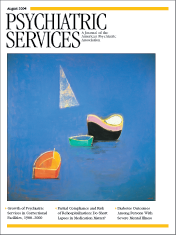Using Conjoint Analysis to Assess Depression Treatment Preferences Among Low-Income Latinos
Abstract
The authors examined the feasibility of conjoint analysis for measuring the depression treatment preferences of low-income, low-literacy Latino primary care patients. Forty-two patients with depression (58 percent of those eligible for the study) completed a survey about preferences for treatment and strategies to reduce barriers to care. They preferred combined counseling and medication to either approach alone and preferred individual over group treatment but did not show a significant preference for treatment setting. The odds of treatment acceptance were increased by the availability of telephone appointments, bus passes, and help with making appointments. Although further validation is required, conjoint analysis appears to be feasible for assessing preferences regarding depression treatment in this underserved population.



